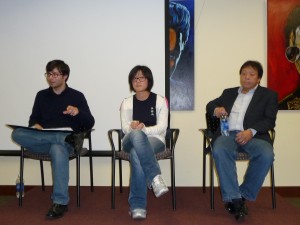
On a bright September morning at the Boston Common, a group of about 20 people breathe in the crisp fall air with their eyes closed and legs crossed.
However, if these people were seen practicing this meditation in China, they would be breaking the law. They are practitioners of Falun Gong, a system of beliefs and practices founded in China in 1992. Since July 1999 the Chinese Communist Party has banned the practice, citing it as “an evil cult.”[1] On Wednesday night three Falun Gong practitioners spoke to an audience of approximately 20 students at the Howard Thurman Center about Falun Gong and human rights in China. The panel was hosted by Amnesty International at BU.
The Falun Gong website describes the practice as consisting of “moral teachings, a meditation, and four gentle exercises that resemble tai-chi and are known in Chinese culture as ‘qigong.’”[2] The practice stands on the core principles of truth, compassion, and tolerance. Why, then, does the Chinese government ban it?
“No one has a clear definite answer. The crackdown is kind of insane,” said Austin James, one of the panelists. [This sentence has been redacted over safety concerns.]
“It poses an ideological threat to the Chinese Communist Party,” said James. “Falun Gong practitioners have an individual conscience, an innate sense of what’s good. But in China, there is a single external authority who dictates morality and behavioral codes.”
However, despite the ban, millions continue to practice it in China. Falun Gong practitioners in China are allegedly burnt, tortured, and even murdered.
“If you step out of line, you’re gone,” said another panelist, Michael Tsang. Tsang, a soft-spoken man with powerful words, was a Tai Chi practitioner for many years but got into Falun Gong after an ex-roommate introduced it to him. Tsang suffered from chronic fatigue and was even bed ridden for three years. However, after just four days of Falun Gong, Tsang said he was cured of the illness.
“It is my miracle,” Tsang said, “And I will never give it up.”
Shahrzad Noorbaloochi, the president of Amnesty International at BU and a senior in the College of Arts and Sciences, has practiced Falun Gong for over three years. Noorbaloochi said Falun Gong exercises are “like sitting inside an eggshell, very comfortably and peacefully.” Noorbaloochi said she has experienced a change in her life after she began the practice.
For Jingjing Sun, the third panelist, the practice has also changed her life greatly. Until a few years ago, Sun was a member of the Chinese Communist Party while studying at Tianjin University in Tianjin, China.
“If I wanted to get a good job or fellowship after university, I had to be affiliated with the Communist Party,” said Sun. “I quickly moved up the ranks of the Party through flattery.”
However, despite being part of the Party, Sun said she was extremely unhappy. After three years of loneliness, Sun said she needed a fresh start and decided to come to the United States to get her Masters in Chemical Engineering at Princeton University. At Princeton, Sun met her present husband, who practiced Falun Gong. Up until then, what Sun knew about the practice was through Chinese media. She saw videos of practitioners setting themselves on fire. Her husband explained the practice, showed her videos, and said that a lot of what she saw was just propaganda. The more Sun learned more about the practice, the more it intrigued her.
“I believed it could help me become a good person, unlike the person I was at my Chinese university,” Sun explained.
Sun, currently a Ph.D. candidate in Biological Engineering at MIT, still hasn’t told her parents, who are still in China, as she believes they can be persecuted due to the constant monitoring.
“Living in China is like the movie The Truman Show: constantly censored, constantly monitored.”
Sun said that the Chinese students association at MIT excludes from her activities as they do not want to be linked to someone who practices Falun Gong.
James, who has done research about the Chinese Communist Party’s crackdowns on minorities, gave two main reasons as to why other nations have not reacted to China’s persecution of Falun Gong practitioners and other minorities.
“The system and international institutions, like the United Nations, themselves can’t fix the problem because of their structure. The Chinese government can just deny them entry,” said James. “It really requires special dedication by individuals.”
Secondly, James said that China’s economic importance to the United States and other nations is undeniable. Nations don’t want to offend China if they want a reporter to go there or to set up a bureau there in the future.
“Foreign media is slow to realize that the country of China is not its government.”
Despite these grim circumstances, the three panelists remained compassionate about their practice and committed to spread knowledge and awareness about the persecution and other human rights violations in China.
“We have to see the horrors with compassion and mobilize,” said Tsang. “We have to let people know… We must uncover the propaganda veil.”
Update
Austin James’s name has been changed and his personal identifying information has been removed over concerns for his safety, as has any other information that could potentially be used to identify him.
[1] http://www.china-embassy.org/eng/zt/ppflg/t36582.htm
[2] http://faluninfo.net/topic/22/

One Comment on “Falun Gong Practitioners Speak Out”